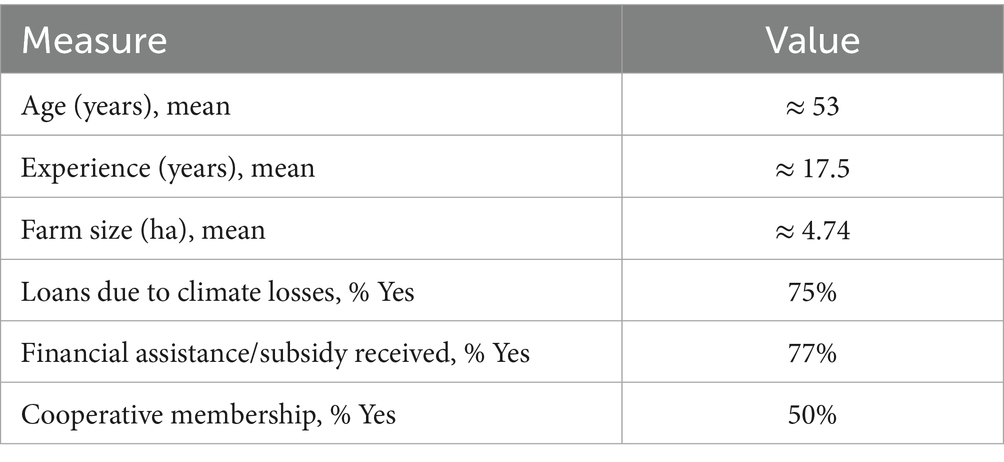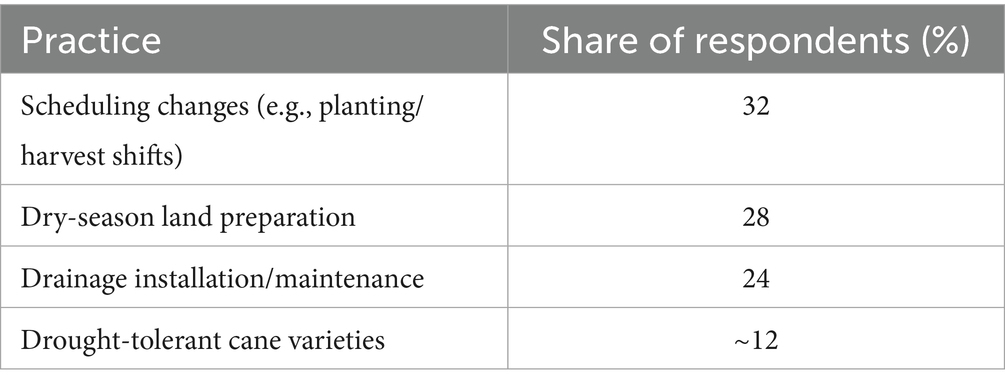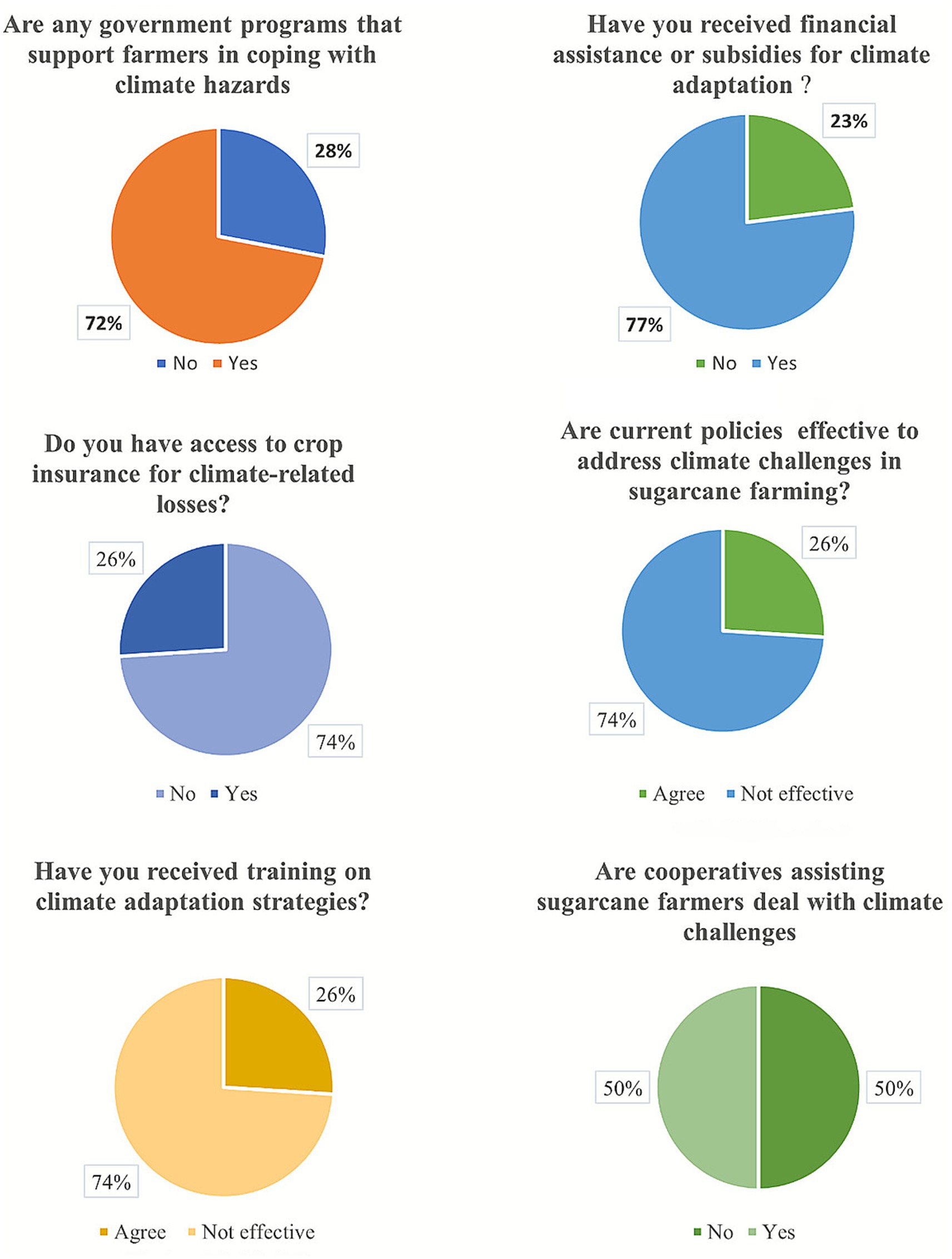- 1The Graduate School, Department of Food Security and Agricultural Development, Kyungpook National University, Daegu, Republic of Korea
- 2Laboratory of Molecular Pathology and Plant Functional Genomics, Department of Applied Biosciences, Kyungpook National University, Daegu, Republic of Korea
Small Island Developing States (SIDS) face accelerating climate hazards that undermine agricultural productivity. Fiji’s sugarcane sector, which is central to rural incomes and foreign exchange earnings, is increasingly affected by floods, droughts, cyclones, irregular rainfall, and rising input costs. Assessing farm-level climate vulnerability is essential for guiding effective adaptation. A convergent mixed-methods design was applied, integrating surveys from 100 smallholder farmers, panel regression to estimate hazard-specific yield elasticities, and AI-assisted scenario modeling aligned with Asian Development Bank climate projections. Stratified sampling captured variation in farm size, location, and cooperative membership, and survey responses were cross-validated with production records to ensure reliability. Flood-related hazards showed the strongest negative association with multi-year yields (β = −0.49, p < 0.001), followed by irregular rainfall and drought effects. Flood impacts were most severe because water-logging, access disruption, and delayed harvesting weakened ratoons and reduced subsequent cycle yields. Socio-institutional constraints, including limited cooperative support, inadequate extension services, and low youth engagement, intensified vulnerability. Grassroots participation, modeled on South Korea’s Saemaul Undong, can strengthen local coordination and adoption of adaptive practices. AI-assisted scenarios provided validated projections and identified priority adaptation pathways. The findings indicate a hydrology-first risk profile in Fiji’s coastal sugarcane systems. Targeted water management and accelerated varietal upgrading are essential to sustaining productivity under increasing climatic extremes. Coordinated investments in drainage, stress-tolerant cultivars, and farmer–extension partnerships can narrow adaptation gaps and stabilize rural livelihoods. Although focused on Fiji, the analysis provides a transferable framework for estimating climate-induced yield elasticities and validating adaptation strategies in coastal smallholder cane systems across tropical Asia, Africa, and the Caribbean. The integrated empirical and AI-based methodology offers a replicable template for climate resilience assessment in tropical agriculture.
1 Introduction
As a frontline nation in the climate crisis, the Fiji Islands, an archipelagic Small Island Developing State (SIDS) in the South Pacific, exemplify the profound challenges faced by nations that are disproportionately impacted by global climate change. Globally, sugarcane-producing regions, such as India, Thailand, and Brazil, face comparable hydrological stress (Gupta et al., 2017; Marin et al., 2013; Pathak et al., 2019; Teixeira et al., 2016). Positioning Fiji as a critical microcosm for studying smallholder resilience in coastal agro-ecosystems, while being renowned for its rich cultural heritage, shaped by centuries of Indigenous Fijian traditions and Indo-Fijian influences (Lal, 2015). The country also has a deep history of agricultural development, shaped by its volcanic origins, fertile coastal plains, and tropical maritime climate (Foye, 1917; Macdonald and Foster, 2024). Among its primary agricultural products, sugarcane (Saccharum officinarum L.) is now under unprecedented and existential threat from escalating climate hazards. Since its introduction during British colonial rule in the late 1800s, sugarcane has profoundly influenced Fiji’s population distribution, land tenure, and development (Moynagh, 2017; Pandey, 2023). Today, Fiji Sugar Corporation (FSC) manages the industry’s milling and export operations, with over 80% of the country’s sugar destined for international markets (McGree et al., 2020). Despite its historical significance, Fiji’s sugarcane sector is becoming increasingly threatened by climate change. The Western Division of Viti Levu, particularly the Nadroga Navosa Province, faces floods, droughts, cyclones, and salinity intrusion patterns mirrored in other tropical smallholder sugarcane regions globally (Magee et al., 2016; PCRAFI, 2011). Climate hazards have increased in both frequency and severity. Cyclone Winston (2016) caused catastrophic damage to crops, infrastructure, and livelihoods. Erratic rainfall, including prolonged droughts and intense storms, further disrupts the sugarcane growing cycle. Between 1996 and 2022, sugarcane production fell by 64%, and planting areas contracted by 50% between 2018 and 2022 (FMS, 2023; FSC, 2023, 2024; Misra and Singh, 2024). These trends signal a critical inflection point for the industry and underscore the urgent need for Climate-Smart Agriculture and targeted adaptation strategies.
The economic and social impacts of these changes are profound, creating a vulnerability nexus. Sugarcane farming supports over 20,000 households and employs a significant share of Fiji’s rural population (FSC, 2024; Raj, 2022) contributing substantially to Gross Domestic Product (GDP), foreign exchange earnings, and local commerce (Narayan and Prasad, 2005; Sugarcane Growers Council, 2020). Climate-induced yield losses, rising production costs, and market volatility gravely threaten the viability of smallholder farms. Farmers face increasing expenses for labor, irrigation, fertilizers, and pest control; however, unstable sugar prices and declining yields erode profitability and household income, leading to pervasive livelihood precarity (Chandra et al., 2018).
Fiji’s archipelagic geography and low-lying coastal settlements increase its exposure to storms, erosion, and sea-level rise. Projected temperature rises of 1.6 °C–3.3 °C and sea-level increases of up to 1 m by 2,100 exacerbate vulnerability (Nunn, 2000; Nunn et al., 2016; Shiiba et al., 2023). Extreme weather, erratic rainfall, and higher temperatures significantly reduce sugarcane yields and increase pest and soil degradation risks (McNamara and Des Combes, 2015). Cyclones and floods have repeatedly caused infrastructure damage and economic losses (Christina et al., 2024; Kumar and Vennila, 2022; Kumar et al., 2013). Demographic trends, such as an aging farmer population and declining youth interest, compound these challenges (Medina Hidalgo et al., 2024). While government initiatives, including policies linked to the Climate Change Act 2021, aim to improve the climate-proofing of the sector, farmers report insufficient insurance, training, and extension service frameworks (Liligeto and Nakamura, 2022; Nand et al., 2024; Nsabiyeze et al., 2024; Raj, 2022). These constraints highlight the need for improved adaptation strategies and inclusive policy interventions that combine local knowledge with scientific evidence.
These mounting pressures have also led to severe social challenges, including food and water insecurity, economic displacement, youth disengagement from agriculture, and accelerated rural exodus to urban centers, threatening long-term food system resilience and intergenerational equity. Despite the recognition of these socio-economic challenges, few studies have quantified how specific climatic hazards affect smallholder sugarcane yields or examined socio-institutional constraints on adaptation. Previous research has generally focused on aggregate climate trends or descriptive vulnerability assessments without isolating hazard-specific yield responses or validating adaptation mechanisms through AI-assisted modeling. Consequently, a critical knowledge gap persists in quantifying how individual climate stressors translate into measurable yield elasticities and policy-relevant adaptation priorities in smallholder systems.
A critical empirical gap remains; few studies have quantified the localized, long-term impacts of specific weather hazards on smallholder sugarcane farmers. Evidence of the effectiveness of adaptation strategies and policies is limited. Most studies have not integrated quantitative yield and climate data into the qualitative insights from farmers and stakeholders. This study bridges this gap by providing an integrated vulnerability assessment that quantifies hazard-specific yield elasticities, evaluates socio-institutional constraints, and validates adaptation pathways using AI-assisted scenario modeling. These findings offer insights applicable to other SIDS and coastal smallholder systems worldwide.
2 Materials and methods
2.1 Study area and design
2.1.1 Study area
This study was conducted in the Maro sector of the Nadroga–Navosa Province, located within Fiji’s Western Division. This settlement was selected because of its high dependence on sugarcane farming as a primary livelihood and its acute vulnerability to climate-related hazards, making it a critical area for assessing the impacts of climate variability on agricultural productivity.
2.1.2 Population and sample
Fiji has 17,019 active sugarcane growers, with approximately 1,171 located in the Western Division (Fiji Sugar Corporation, 2024; Sugarcane Growers Council, 2020). The study sample consisted of 100 registered sugarcane farmers, representing approximately 8.5% of the active growers in the division. Participants were selected through stratified purposive sampling to capture variations in farm size and cooperative membership, ensuring that diverse socio-economic conditions within the settlement were represented despite the single-location focus.
2.1.3 Selection criteria and verification
Eligible participants were active sugarcane farmers who were directly involved in both planting and harvesting activities, with at least 10 consecutive years of farming experience and valid land registration under the Fiji Sugar Corporation database. All participants were verified by the local growers’ gang in charge to ensure the representativeness and authenticity of the data. Stratification by farm size and cooperative membership further reduced sampling bias and ensured balanced representation across different socio-economic groups within the settlement.
2.1.4 Data reliability and rationale
Data reliability was strengthened through triangulation with Fiji Sugar Corporation production records and cross-validation of self-reported yields. Additionally, qualitative insights from key stakeholder interviews complemented the quantitative survey data. This approach provides a robust foundation for analyzing climate-induced impacts on sugarcane farming, combining empirical yield data with farmer perspectives to capture both the magnitude and contextual drivers of production variability (Figure 1).
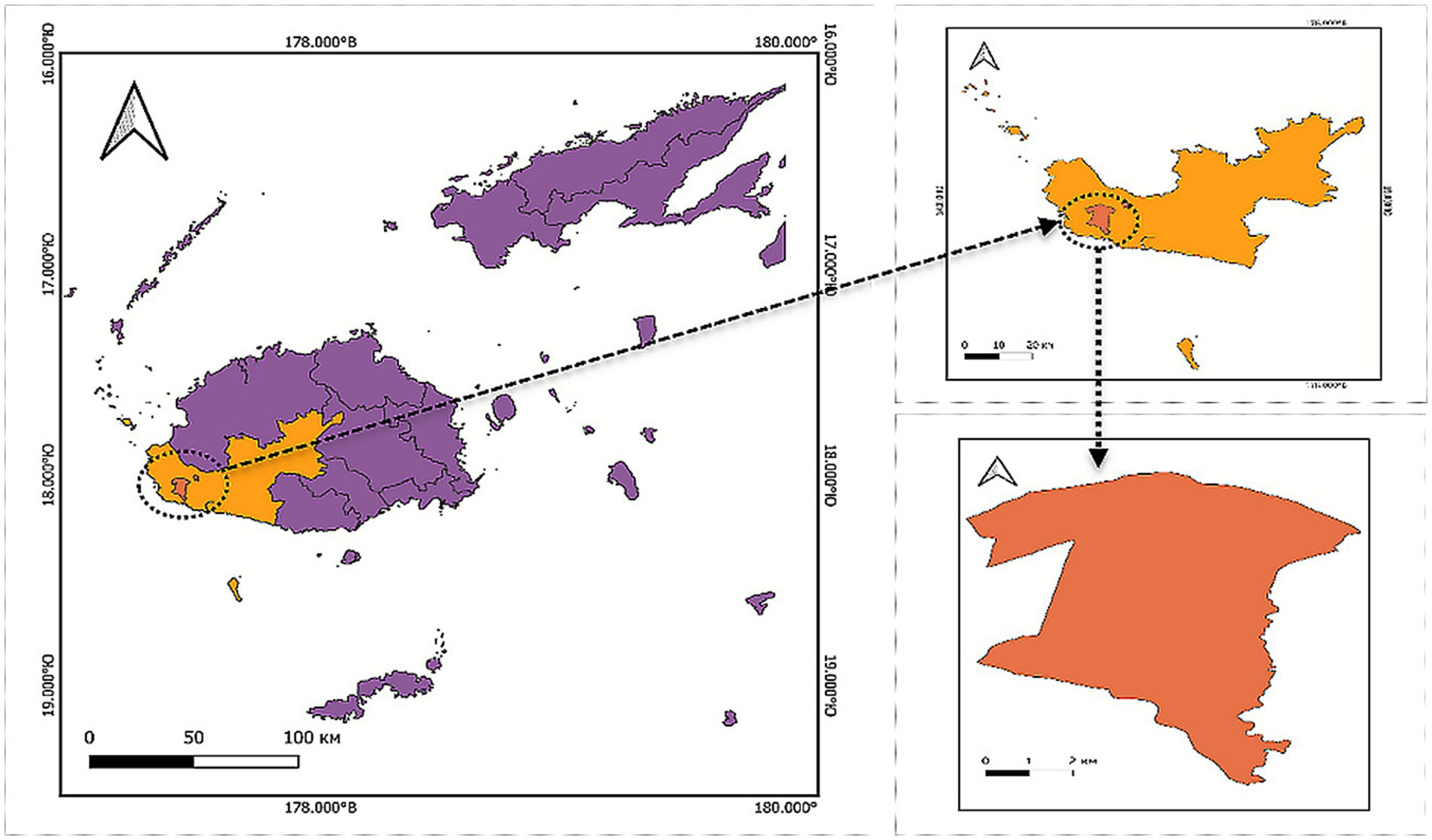
Figure 1. Study area map of Fiji showing the Western Division and Nadroga–Navosa Province (orange), with the Maro sector inset.
2.2 Research questions and objectives
Based on the identified empirical and methodological gaps, this study aims to provide an integrated vulnerability assessment for Fiji’s sugarcane sector. Specifically, this study is steered by the following research questions:
1. What are the localized, long-term impact estimates (quantified as β coefficients) of specific climate hazards (floods, irregular rainfall, droughts, and cyclones) on the multi-year sugarcane yield for smallholders in Nadroga–Navosa?
2. How do climate-induced production losses and rising costs intersect with socio-economic factors and institutional constraints (including youth engagement and access to support systems) to shape farmer vulnerability and limit the uptake of adaptation practices?
3. Based on the empirical findings, how can a coordinated, field-ready adaptation and delivery model be formulated to address the primary climate risks (targeted water management and varietal upgrading) for Fiji’s sugarcane sector and analogous SIDS?
2.3 Instruments and variables
Structured surveys were used to collect information on farm characteristics, sugarcane yields, management practices, and farmers’ perceptions of climate hazards. The survey responses were cross-validated with official production trend records from Fiji Sugar Corporation’s annual reports to guarantee data reliability. Additionally, key informant interviews with harvesting gang leaders and extension officers were conducted to capture the socio-institutional factors influencing adaptive capacity, complementing the quantitative data.
2.3.1 Variables
A. Dependent variable: Sugarcane yield (tons per hectare)
B. Independent variables: Frequency and severity of floods, droughts, cyclones, and rainfall variability
C. Socio-economic variables: Farm size, cooperative membership, access to extension services, and farmer demographics
D. Adaptation measures: Irrigation practices, varietal choices, and crop management interventions
2.4 Statistical analysis
Descriptive statistics were used to summarize the key stressors, cost structures, and adaptive practices. To test for between-group differences (e.g., by farm size, experience, or cooperative membership), we employed one-way ANOVA and independent-samples t-tests, which are appropriate for comparing mean responses across groups (Field, 2017).
Associations between specific climate hazards and multi-year cane output were then estimated using ordinary least squares (OLS) regression with robust standard errors to account for heteroskedasticity, a method widely applied in agricultural and development economics (Wooldridge, 2016) (Equation 1):
Where:
• Yᵢ = multi-year sugarcane output for farm i
• β₀ = constant term (intercept)
• β₁, β₂, β₃, and β₄ = estimated coefficients showing the marginal effect of each climate hazard
• Floodᵢ, Irregular Rainᵢ, Cycloneᵢ, Droughtᵢ = indicator or intensity measures of climate hazards faced by farm i
• εᵢ = error term, capturing unobserved factors
Model fit was reported using the coefficient of determination (R2) and its adjusted form, while overall significance was assessed using the standard ANOVA F-test (Field, 2017) (Equation 2):
Where:
• SSR = regression sum of squares
• SSE = error sum of squares
• k = number of predictors
• n = sample size
To assess multicollinearity, variance inflation factors (VIF) were computed for each predictor, a widely used diagnostic in regression modeling (Kutner et al., 2003) (Equation 3):
Where:
• VIF_j = variance inflation factor for predictor j
• R_j^2 = coefficient of determination from regressing predictor j on all other predictors
All VIF values fell well below the conventional cut-off thresholds, indicating no serious multicollinearity. The study workflow, from problem definition and theoretical framing through institutional permissions, survey implementation, data integration, and synthesis of findings, is shown in Figure 2. This framework demonstrates how qualitative insights and quantitative modeling (SPSS-based robust OLS with diagnostic checks) were braided to address the research questions.
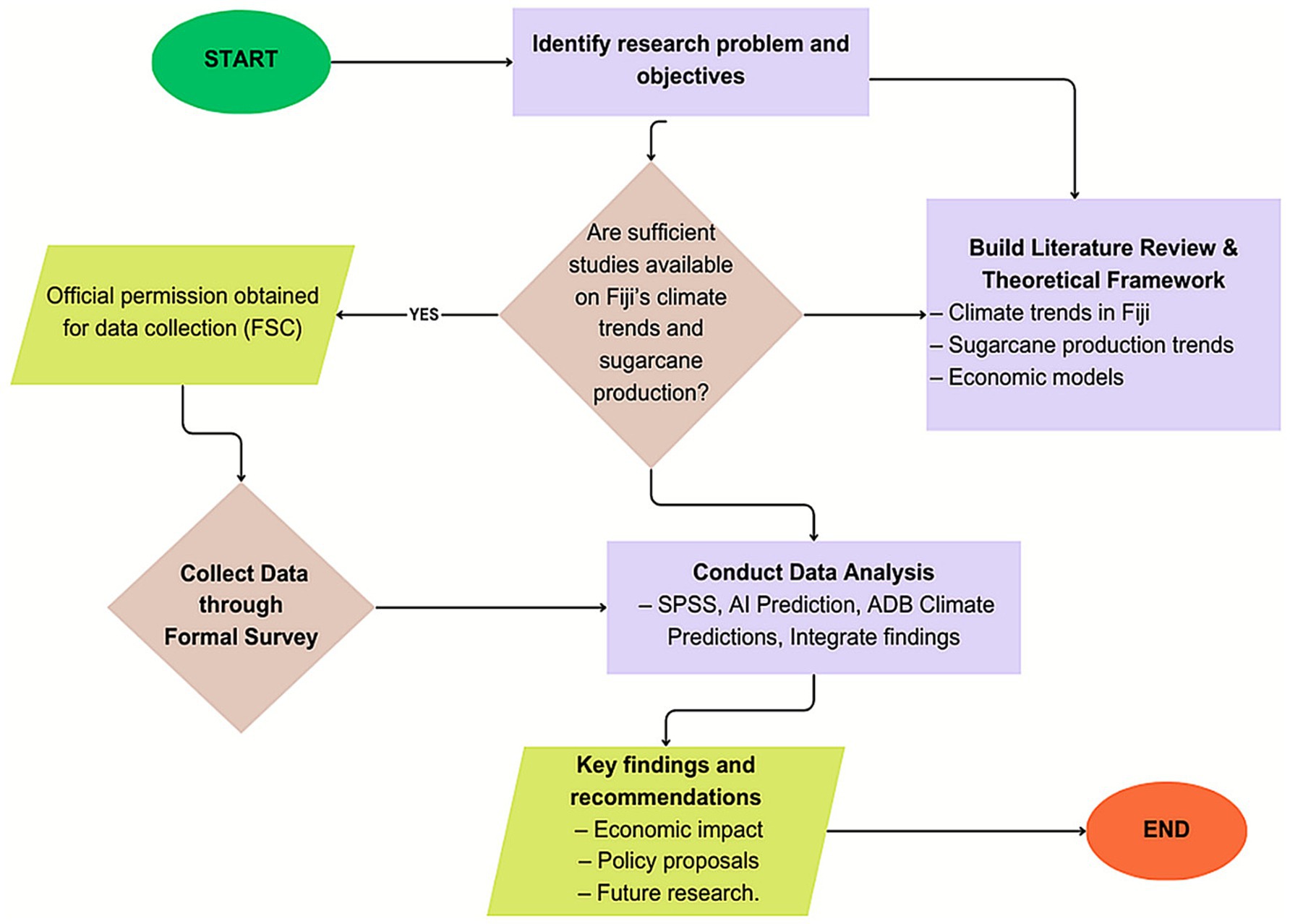
Figure 2. Methodological process illustrating the research framework for quantifying climate-induced economic precarity in Fiji’s sugarcane sector.
2.5 AI-assisted scenario analysis (ChatGPT) and benchmarking against ADB projections
We complemented our empirical analysis with an AI-assisted scenario exercise using ChatGPT (OpenAI; accessed March 2025). The objective was not to produce physical climate forecasts but to synthesize plausible sector pathways for Fiji’s sugarcane under alternative climate hazards and policy responses and to triangulate these pathways against published projections from the Asian Development Bank climate outlook for Fiji.
2.5.1 Procedure
We provided structured prompts summarizing (i) study area and baseline sector features; (ii) hazard profiles (drought, flood, irregular rainfall, and cyclones); and (iii) candidate adaptations (water management, cultivar choice, risk finance, and extension). We requested hazard-specific directional effects on yield/costs and qualitative uncertainty labels. We then compared the outputs to the ADB report’s weather projections for Fiji and our empirical patterns (Sections 3–4). The outputs were treated as scenario narratives (not model predictions). We documented prompts, timestamps, and post-processing steps and reported them in the Supplementary information. All interpretations were verified using our data and published sources.
2.5.2 Analytical value and integration
The AI-assisted scenario exercise strengthened the analytical depth of this study by integrating an expert-like synthesis with empirical validation. The outputs provided a structured comparison of hazard-specific risks and adaptive responses, complementing statistical trends with plausible sectoral trajectories. This hybrid approach enhanced interpretive confidence by linking observed patterns to forward-looking possibilities under varying climate and policy conditions. Importantly, the exercise demonstrated how generative AI can function as an adaptive research instrument, supporting hypothesis testing, sensitivity exploration, and data triangulation in resource-limited contexts. While not a substitute for physical or econometric models, it served as a rapid foresight tool, offering narrative-based benchmarks that improved the contextual understanding of Fiji’s sugarcane adaptation pathways within broader regional projections.
2.6 Ethics and reproducibility
Participation was voluntary, informed consent was obtained, and responses were anonymized. Institutional and community approvals preceded fieldwork.
3 Results
3.1 Farmer characteristics and production
Respondents averaged approximately 53 years of age with about 17.5 years of cane-growing experience, farming on an average landholding of 4.74 ha. Institutional access and financial exposure further illustrate their vulnerability: three-quarters reported taking loans in response to climate-related losses, 77% received some form of financial assistance or subsidy, and half were cooperative members (Table 1). The multi-year output trend during 2014–2024, shown in Figure 3, exhibits significant variability and a sharp decline in 2016, reflecting differential exposure and adaptive capacity across farms.
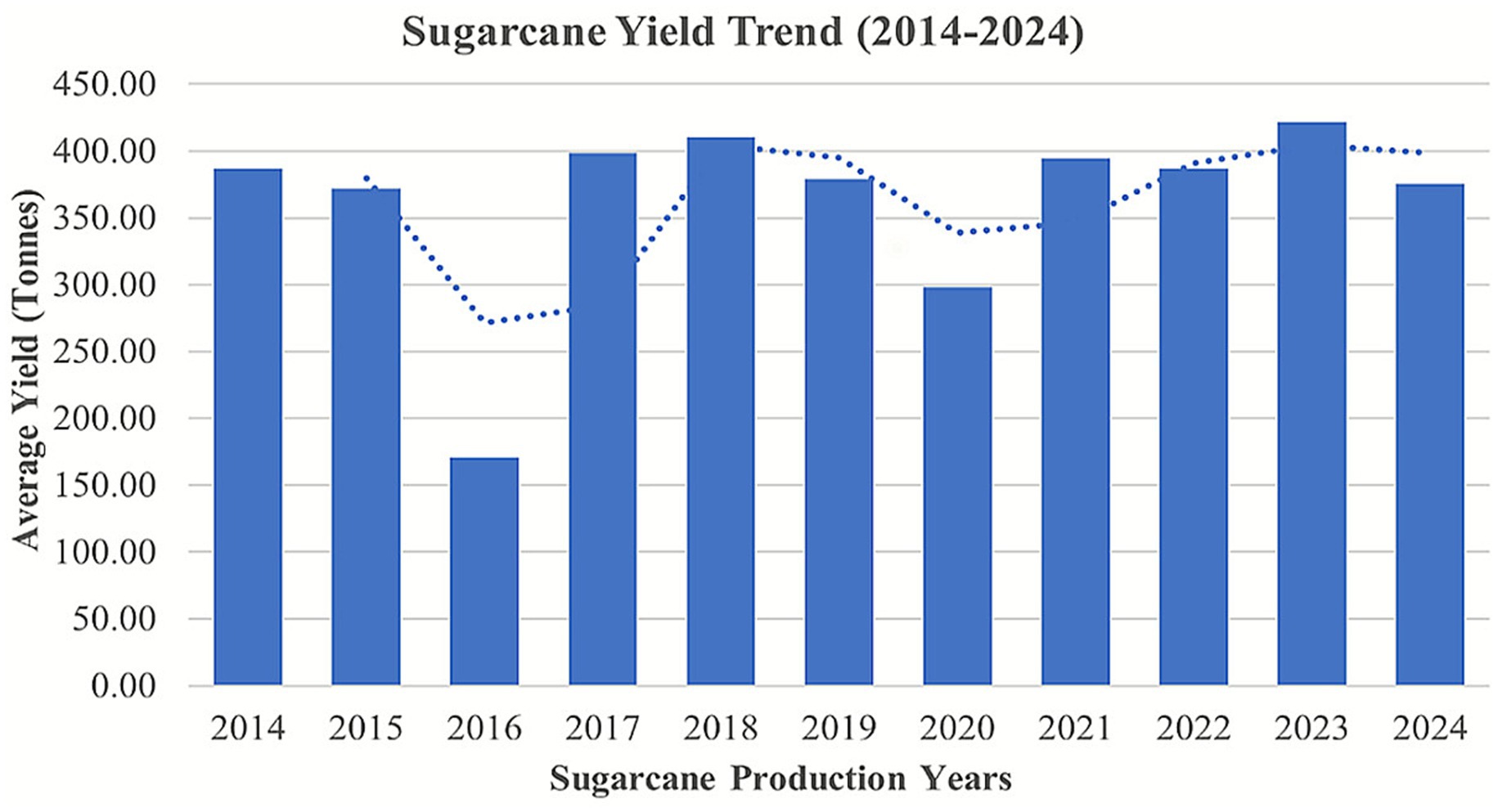
Figure 3. Sugarcane production trend for surveyed farms, 2014–2024; the 2016 low coincides with Tropical Cyclone Winston.
The sugarcane yield trend shown in Figure 3 highlights the sector’s acute vulnerability to extreme weather events. The dramatic dip in the average yield in 2016 is particularly pronounced and coincides with the passage of Tropical Cyclone Winston, a Category 5 storm that caused widespread damage across Fiji. While yields generally recovered and stabilized in subsequent years, the overall variability and depth of the 2016 loss underscored the significant economic shock climate extremes imposed on the smallholder system.
3.2 Reported climate stressors and economic consequences
Farmers reported intensifying extremes consistent with a hydrology-first risk profile: droughts and floods were the most frequently cited, alongside irregular rainfall, rising temperatures, perceived soil fertility decline, and increased pest and disease pressure. These hazards reflect both acute shocks and timing-related water stress that disrupt crop establishment and harvest logistics. In parallel, 75% of respondents reported rising production costs, with the largest shares attributed to land preparation (17.3%), labor (15.5%), and fertilizer (13.7%), followed by irrigation, transport, and other inputs. Together, these findings demonstrate how climate hazards and cost pressures compound to erode farm viability (Figures 4A,B).
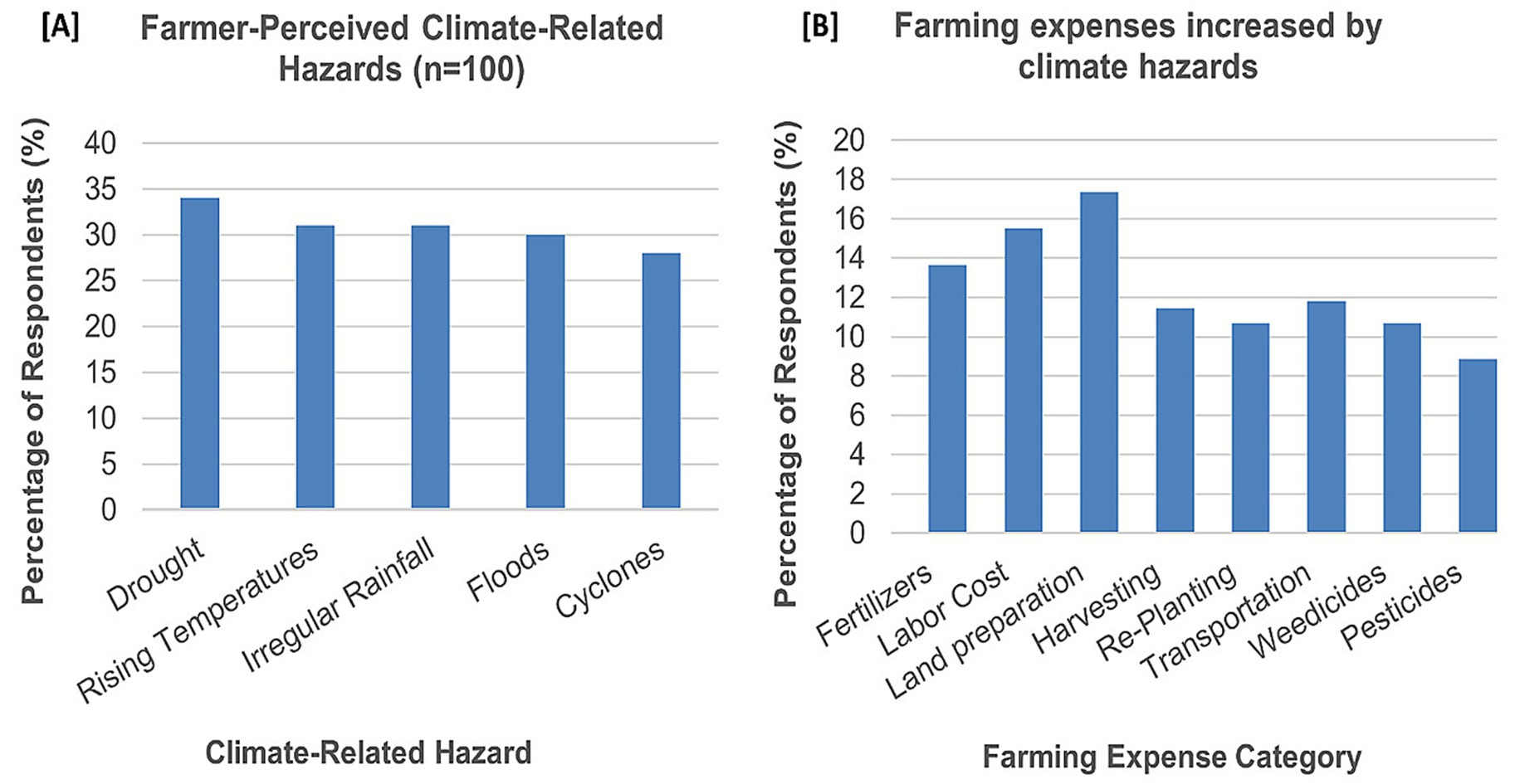
Figure 4. (A) Farming expense categories were reported to have increased due to climate hazards (% of respondents). (B) Farmer-perceived climate-related hazards (n = 100; % of respondents; multiple responses were allowed).
The survey data demonstrated that droughts, floods, and rainfall irregularities were the dominant stressors, corresponding to the largest yield reductions observed in the regression analysis (Section 3.3). Rising production costs for land preparation (17.3%), labor (15.5%), and fertilizer (13.7%) act as compounding financial stressors, reinforcing livelihood vulnerability.
In response to escalating climate hazards, farmers have reported adopting a range of primarily incremental adaptation strategies. The most common practice was adjusting planting and harvesting schedules, cited by 32% of the respondents. Nearly one-third (28%) undertook land preparation during the dry season to minimize flood-related risks, whereas 24% installed or maintained drainage systems to manage excess water. More technologically advanced measures remained limited, with only approximately 12% adopting drought-tolerant sugarcane varieties. These findings highlight that while adaptive practices are being implemented, they are largely short-term and incremental, reflecting financial and institutional constraints (Table 2).
3.2.1 Youth engagement and intergenerational perspective
Survey responses revealed that a significant proportion of farmers perceived declining youth interest in sugarcane cultivation. Specifically, 62% of the respondents reported that their children or younger household members were not interested in continuing sugarcane farming, citing low profitability, high labor demands, and limited innovation as key deterrents (Figure 5A). Despite this challenge to generational renewal, most farmers (63%) expressed cautious optimism that the industry could survive climate change, whereas 37% did not share this belief (Figure 5B). This declining youth engagement represents a structural risk to adaptive capacity, suggesting that generational renewal in Fiji’s sugarcane sector is becoming increasingly constrained.
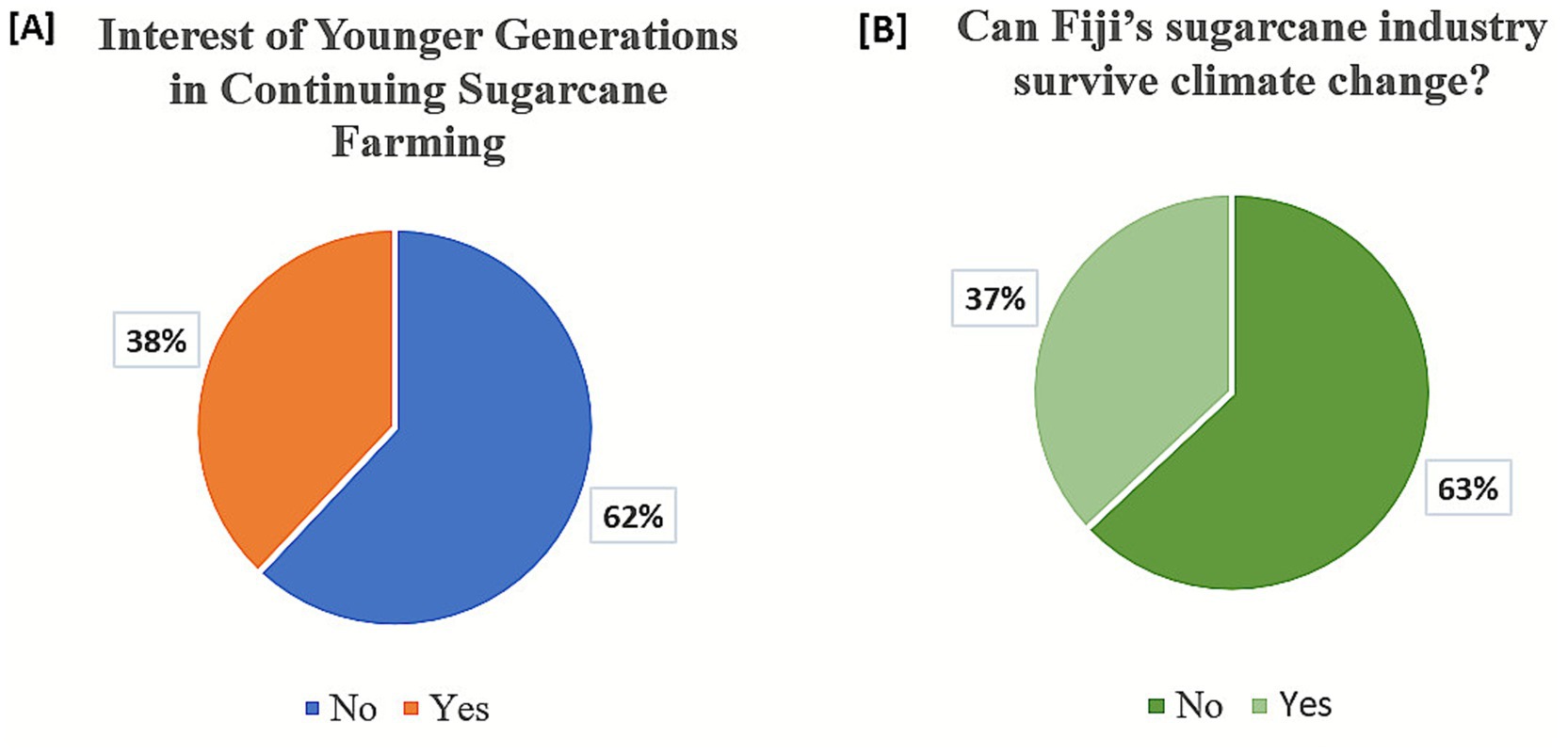
Figure 5. Youth interest in sugarcane farming and perceived industry resilience. (A) 62% of youth are uninterested in continuing farming, while (B) 63% of respondents believe the industry cannot survive climate change.
3.3 Regression: estimated effects of hazards on output
Floods exhibited the highest negative impact (β = −0.496, p < 0.001), followed by irregular rainfall (β = −0.243, p < 0.001), cyclones (β = −0.143, p = 0.019), and drought (β = −0.155, p = 0.020). These hazard-specific elasticities quantify the relative risk contributions of each climate factor to sugarcane yield losses, highlighting priority areas for targeted interventions. Effect sizes and uncertainty are visualized in the coefficient plot (Figure 6), and the detailed regression coefficients are presented in Table 3.
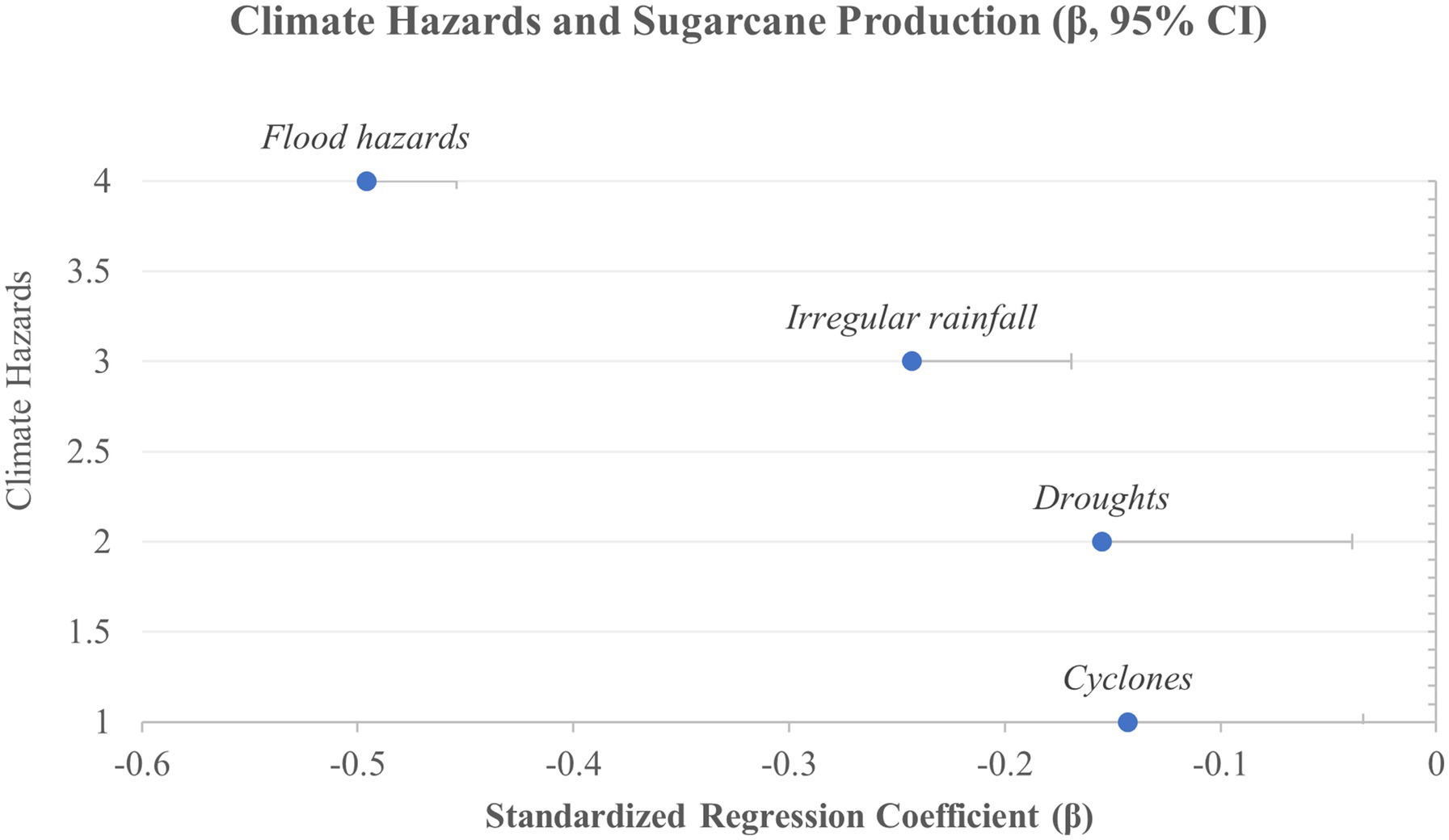
Figure 6. Standardized regression coefficients (β) with 95% confidence intervals for climate hazards predicting sugarcane production.

Table 3. Ordinary least squares regression results for the effects of climate hazards on multi-year sugarcane output.
These hazard-specific elasticities quantify the relative risk contributions of each climatic factor to sugarcane yield losses. Figure 6 visually displays these effect sizes and their confidence intervals, highlighting the dominant-negative impacts of floods. This provides clear evidence-based guidance for targeting interventions where they will be most effective.
3.4 Benchmarking AI scenarios with ADB climate projections for Fiji
The AI-assisted scenarios were directionally consistent with the ADB projections that emphasize more intense rainfall extremes and coastal flood risk, with drought risk varying by season and locality. The AI outputs similarly ranked flooding and irregular rainfall as the dominant channels of production loss, followed by drought and cyclones, matching our regression ordering and hotspot mapping. Where divergence occurred, AI narratives added market/behavioral channels (input price shocks, youth exit), often not quantified in the ADB outlook but visible in our survey.
Across hazards, the AI scenarios and ADB projections show directional agreement and consistent rank ordering. Both sources emphasize heavier rainfall extremes and stronger high wind/cyclone events by the mid-century, with temperature extremes also rising (ADB, 2013). This ordering matches our empirical loss patterns. The hotspot analysis results are shown in Figure 5. Differences are expected where indicators are not directly comparable (AI rainfall variability % vs. ADB 99th-percentile rainfall); therefore, we report ordinal rather than numeric concordance. AI scenarios additionally identify economic and behavioral channels, including price shocks and youth exits, which are not captured in the ADB projections. This integration provides a practical framework for prioritizing field-level adaptation interventions.
3.5 Climate-risk hotspots and economic losses
The rank of loss channels in the AI scenarios, rainfall/waterlogging, cyclones, and drought/heat is consistent with ADB’s emphasis on heavier rainfall and high-wind extremes and with our regression/hotspot results. To illustrate sector trajectories under stress, Figure 7 shows projected output paths from a 2023 baseline under moderate (−3% yr.−1) and severe (−5% yr.−1) decline scenarios, used for stress testing and aligned with the hazard ordering in Table 4.
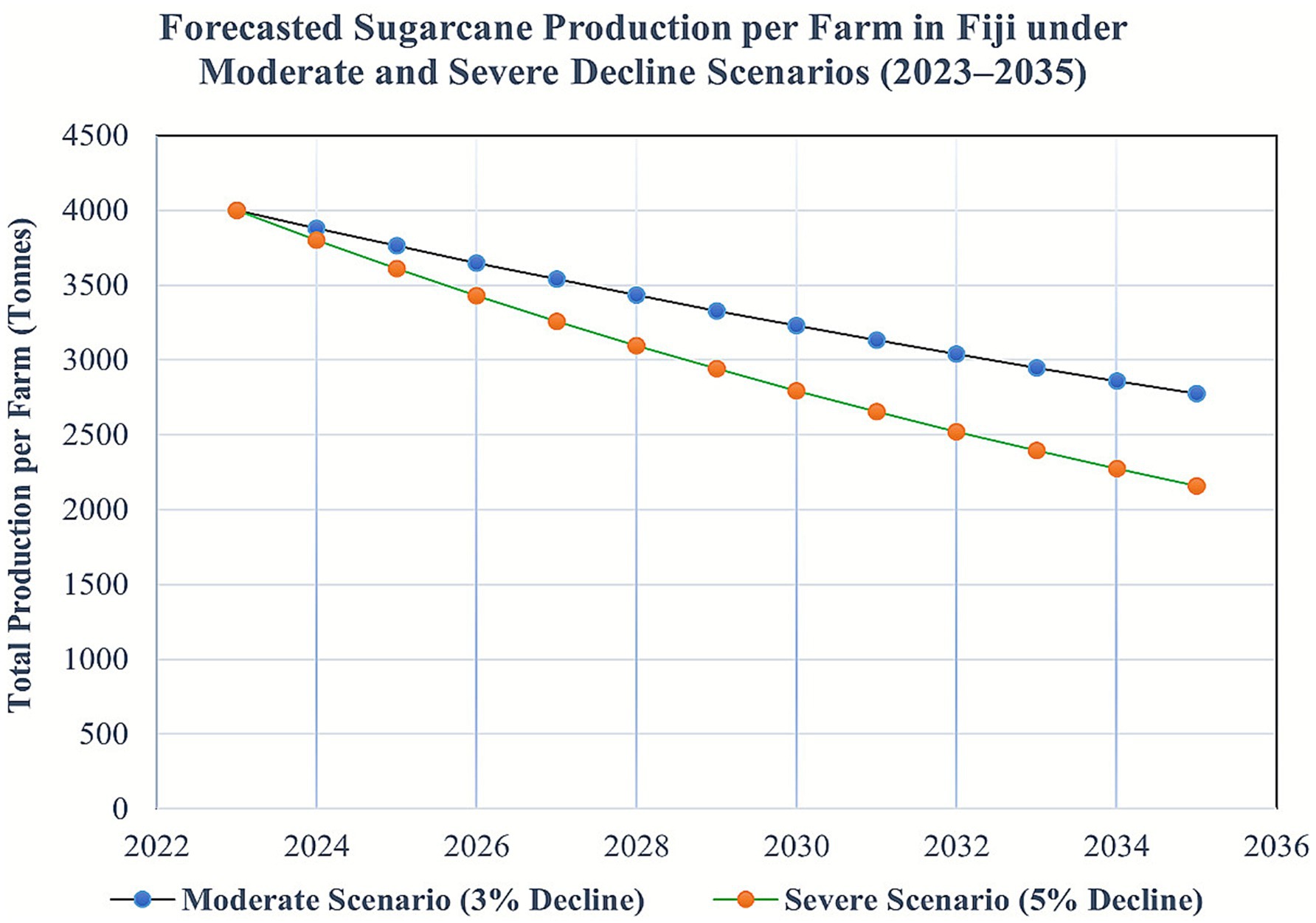
Figure 7. Artificial Intelligence (AI) predicted sugarcane production per farm in Fiji under moderate (−3% yr.−1) and severe (−5% yr.−1) decline scenarios, 2023–2035.

Table 4. Concordance between AI predictions and Asian Development Bank (ADB) climate risk classifications.
Projected sugarcane production per farm in Fiji under moderate (−3% yr.−1) and severe (−5% yr.−1) decline scenarios, 2023–2035. Lines apply the compound annual decline from a 2023 baseline (≈4,000 t/farm), yielding ≈2,780 t (−30%) under −3% and ≈2,160 t (−46%) under −5% by 2035. Scenario narratives for stress testing, not calibrated forecasts; see Methods (Section 2.4).
The decline paths are consistent with the risk ranking in Table 4: heavier rainfall/waterlogging and timing disruptions dominate losses, followed by droughts and secondary cyclones. Hotspot effects are concentrated in flood-prone coastal zones and river basins (Table 5), reinforcing priorities in drainage/flood work and on-farm water management. Hotspot mapping indicated that the coastal and river basin areas experienced disproportionate economic losses, emphasizing the need for targeted drainage, flood control, and water management interventions (Table 5; Figure 7). These findings can be used to inform spatially differentiated adaptive planning strategies.
The descriptive and inferential results presented above outline the empirical patterns of climate impacts, costs, and adaptive responses. Interpretive implications and theoretical synthesis are discussed in Section 4 to maintain analytical clarity and avoid overlap between the findings and interpretation.
4 Discussion
4.1 Principal findings and interpretation
This study robustly demonstrates that smallholder sugarcane farmers in Nadroga Navosa Province, Fiji, are experiencing profound and accelerating vulnerability to a complex array of climate hazards, including intensified droughts, recurrent floods, increasingly irregular rainfall, and a surge in pest and disease outbreaks. As shown in Figure 4, an overwhelming majority (73%) of the surveyed farmers reported more frequent droughts and floods, while an equal proportion noted increased pest and disease occurrences. These on-the-ground observations strongly corroborate macro-level projections and empirical studies, which consistently highlight the increasing unpredictability and severity of weather hazards across the Small Island Developing States (SIDS) in the Pacific region. Together, the pattern indicates that hydro-climatic extremes, notably excess water and rainfall timing, are the dominant risk channels for cane production in this setting. The regression results support these observations, showing that floods and irregular rainfall are the dominant yield-reducing hazards. Droughts and cyclones are secondary but still significant. This hazard-specific quantification strengthens our understanding of adaptive priorities at the farm scale.
The economic ramifications of these climatic shocks are not merely substantial but existential. Approximately 75% of farmers experienced alarming increases in production costs, particularly for labor, fertilizers, and land preparation (Figure 4), alongside widespread yield and income losses. Such financial pressures, often leading to reliance on loans and external support, align with previous findings that climate shocks destabilize agricultural supply chains and severely undermine farmers’ profitability in Fiji. Cost inflation, therefore, acts as a shock amplifier, tightening cash flow constraints and limiting the ability to invest in preventative adaptation.
In response to escalating climate threats, farmers have reported adopting a range of mostly incremental adaptation strategies. The most frequently cited included adjusting planting and harvesting schedules (32%), land preparation during the dry season (28%), and installing drainage systems around cane farms (24%). Additionally, crop residue management techniques, such as leaving cane trash post-harvest to suppress weeds and improve soil quality, were reported by 16% of the respondents. However, the uptake of more technologically advanced or transformative adaptation measures remains notably limited. For instance, only 12% of farmers reported using drought-tolerant sugarcane varieties (e.g., Mana and Viwa), whereas engineered water management practices were largely absent. These results unequivocally suggest that current adaptation efforts are limited in both scale and sophistication and are constrained by barriers related to access to appropriate technology, critical information, and financial resources. This constitutes a widening adaptation gap in the high-exposure zones of the cane belt.
4.2 Integrating AI scenarios with published climate projections
Our empirical findings, AI scenarios, and ADB outlook jointly indicate a hydrology-first risk profile: heavier rainfall and waterlogging dominate the observed losses, with cyclones intensifying damage and drought as secondary but important constraints. The AI exercise contributes to operational clarity by linking climate drivers to farm-level levers (drainage retrofits, efficient irrigation, certified seeds for stress-tolerant cultivars, risk-layered finance, and farmer-centered extension), which our survey and hotspot mapping also support. We, therefore, treat the AI scenarios as concordant narratives rather than forecasts used to frame mechanisms and delivery priorities. This analysis unequivocally demonstrates that without urgent and accelerated adaptation, Fiji’s sugarcane sector faces a steep and unavoidable production decline, threatening both rural livelihoods and vital national export earnings, thereby compounding Fiji’s climate development trap. Although scenario magnitudes depend on assumptions, the direction and relative ranking of risks (flooding, irregular rainfall, drought, and cyclones) are consistent with agronomic pathways observed locally.
4.3 Mechanisms and consistency with prior work
Sugarcane performance is tightly linked to water balance at critical growth stages. Short water deficits during formative and grand growth reduce tillering and internode elongation. Conversely, waterlogging suppresses root aeration and photosynthesis and increases lodging and disease pressure effects amplified in heavier, poorly drained soils typical of Fiji’s cane lands. Our regression coefficients corroborate these physiological mechanisms, indicating that flood- and rainfall-timing disruptions had the largest negative impact on yield. Evidence from comparable tropical cane systems reinforces the notion that drainage and field access are critical first-line defenses.
4.4 Literature synthesis and comparative insights
The observed increase in pest and disease outbreaks under extreme weather conditions (Figure 4) is corroborated by (Kumar and Vennila, 2022; Nega, 2025), who highlighted the vulnerability of sugarcane crops to heightened pest pressures under warmer and more humid climatic conditions. Similar findings have been reported across tropical agricultural systems, where erratic rainfall and rising temperatures have disrupted pest life cycles, increased reproductive rates, and reduced the effectiveness of conventional pest management strategies (Msomba et al., 2024; SRIF, 2014; Subedi et al., 2023). These patterns underscore that pest and disease management will become an increasingly complex challenge in the context of climate change, necessitating integrated climate-responsive agroecological approaches. In practical terms, this points to pairing drainage/soil-health measures (e.g., trash blanketing, traffic control) with integrated pest management calibrated to extreme-weather windows.
The survey results indicated a decline in youth participation in sugarcane farming. 62% of respondents reported that younger family members are uninterested in continuing cultivation, reflecting an intergenerational gap and future labor risk (Figure 5A). Regarding the industry’s resilience, 63% believed Fiji’s sugarcane sector can survive climate change with adaptive reforms, while 37% were pessimistic (Figure 5B). These results reveal cautious optimism amid persistent vulnerability. Similarly, Medina Hidalgo et al., 2024 reported declining youth participation in the Fijian sugar sector, citing limited economic prospects, high labor demands, and a lack of innovation and mechanization as key deterrents. This is consistent with studies from other Small Island Developing States (SIDS), which reveal that younger generations often perceive agriculture as economically unattractive and socially undesirable (Dean, 2022). This demographic shift presents a profound structural threat to long-term sector sustainability, as aging farmer populations may be less inclined or able to adopt innovative or labor-intensive adaptation strategies, posing a risk to the sector’s adaptive capacity. Targeted youth pathways (field schools, certification, incubators, and micro-grants) therefore become a resilience lever, not just a workforce policy.
Moreover, findings from this study critically underscore the suboptimal uptake of advanced adaptation practices, aligning with prior literature that emphasizes not only economic and technical constraints but also significant behavioral and informational barriers. For instance, (Prasad et al., 2021; Singh, 2020) observed that many farmers in Fiji demonstrate a fatalistic view toward climate impacts, often perceiving them as inevitable and beyond human control. This sense of resignation hampers the willingness to engage with available adaptation options, especially in the absence of clear, long-term economic benefits and actionable, user-friendly guidance. These insights support the argument that adaptation strategies must go beyond infrastructure and technology to include behavioral change interventions, capacity building, and the co-production of locally relevant knowledge. Collectively, the study’s findings reinforce the broader scholarly consensus that addressing climate change in the agricultural sector requires an integrated approach that combines technical, institutional, and socio-cultural dimensions to enhance resilience and secure future agricultural productivity. Accordingly, a co-produced, farmer-centered extension is essential to translate climate risk into practical, economically viable farm decisions.
The methodological innovation of this study lies in operationalizing an AI-assisted validation of econometric hazard models. This dual-layered approach generates the first quantified dataset of hazard-specific yield elasticities for Pacific Small Island Developing States while demonstrating how generative AI scenario narratives can complement traditional regression analysis. This synthesis provides a replicable framework for integrating empirical data with predictive foresight to inform adaptive planning in other tropical agricultural economies.
4.5 Policy and institutional gaps
Although institutions are expected to play a crucial role in supporting farmer adaptation, their limited presence and ineffective implementation significantly exacerbate vulnerability. Only 28% of respondents acknowledged government programs (Figure 8), whereas 72% reported no access to institutional support, meaning that they were either unaware of existing programs or did not receive timely updates. This gap is particularly concerning given the changing climate patterns, which intensify floods, droughts, and irregular rainfall, directly threatening sugarcane productivity.
Institutional fragmentation, unclear agency mandates, and weak coordination prevent farmers from obtaining timely guidance and resources. Existing programs often fail to align with smallholder realities, socio-economic constraints, and traditional practices, thus reducing their relevance and uptake. As Fiji’s sugarcane economy stands at a crossroads, balancing climatic risks with economic sustainability, strengthening institutional capacity, and delivering context-specific, actionable interventions is critical to enhance resilience and secure the sector’s future.
4.5.1 The financial and risk coverage failure
The institutional system is failing to provide essential financial and risk-layering support, severely exacerbating the economic vulnerability of smallholders. A vast majority of the respondents (77%) reported receiving no financial assistance or subsidies for climate adaptation (Figure 8). Access to formal risk management tools is also critically low, with less than one-third (26%) reporting practical access to crop insurance. This systemic coverage failure leaves the remaining 74% fully exposed to climate-related losses. This limited access to finance and insurance directly contributes to the finding that three-quarters of farmers must resort to taking loans after climate shocks, creating an acute debt vulnerability (Liligeto and Nakamura, 2022; Nand et al., 2024). Without targeted financial and risk management interventions, smallholders remain trapped in a cycle of climate-induced economic instability (Figure 9).
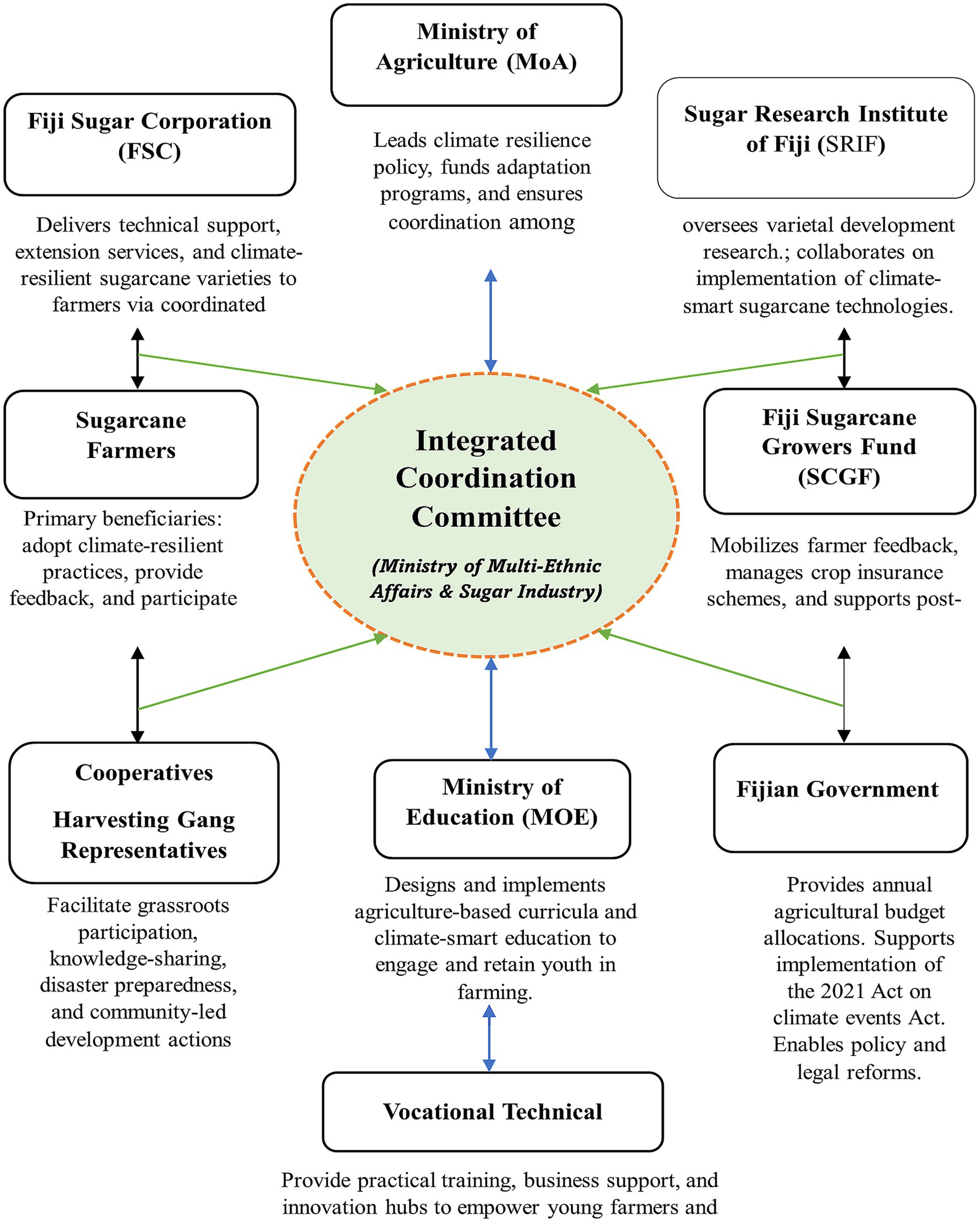
Figure 9. Adaptation framework: Integrated Coordination Committee (ICC) model linking policy, research, extension, finance, and farmer feedback.
4.5.2 Capacity deficits and policy perception
The absence of proactive extension services and structured training underscores a critical failure in building the adaptive capacity of smallholder farmers. A substantial 74% of the respondents reported receiving no formal training on climate adaptation strategies, indicating a significant knowledge and skill deficit that limits their ability to respond effectively to increasing climate hazards. This shortfall is reflected in the low overall perception of government initiatives, with 74% of farmers rating current policies addressing climate risks as “not effective” (Figure 8). While some farmers, approximately half, noted limited assistance from cooperatives, this local-level support remains insufficient to compensate for the fragmented and largely ineffective national-level institutional framework. The lack of coordinated extension services and training opportunities not only reduces farmers’ awareness of adaptation measures but also diminishes their capacity to implement them efficiently. These findings highlight the urgent need for inclusive farmer-centered adaptation strategies, stronger institutional coordination, and targeted knowledge transfer programs that bridge the gap between policy design and implementation. Strengthening these mechanisms is essential to ensure that adaptation support reaches smallholders, enabling them to build resilience against climate-induced shocks and safeguard the long-term sustainability of Fiji’s sugarcane sector.
The economic and climate vulnerabilities experienced by smallholders are compounded by significant deficiencies in institutional support and policy implementation. Farmer responses regarding access to government programs, risk financing mechanisms, and climate-specific training reveal a profound gap between the formal policy landscape and practical support at the farm level, as shown in Figure 8.
Operationally, the Integrated Coordination Committee (ICC) outlined in the recommendations (Figure 6) provides a delivery spine that links the Sugar Research Institute of Fiji (SRIF)–Fiji Sugar Corporation (FSC) R&D/seed systems, Ministry of Agriculture (MoA) infrastructure targeting, Sugar Cane Growers Fund (SCGF) risk finance, and Ministry of Education (MOE) vocational training with cooperatives and farmer representatives. The ICC’s quarterly cycle, public delivery plan, and KPI dashboard institutionalize top-down policy/finance with bottom-up feedback on adoption, improving accountability and speed to scale. Given this study’s evidence of exposure, costs, and adoption barriers, a coordinated platform is necessary to close the adaptation gap identified above.
In addition to institutional limitations, this study identified salient behavioral and informational barriers that further constrain the adaptive capacity of sugarcane farmers. A significant proportion of respondents demonstrated limited awareness of the underlying drivers of their vulnerabilities, indicating a cognitive disconnection between lived experiences and the broader climate risk context. This lack of self-recognition impedes timely and informed adaptive decision-making. Furthermore, adaptation strategies are seldom communicated with a clear articulation of their long-term economic benefits, reducing their perceived utility among farmers, who are focused on immediate survival and cost minimization. A pervasive sense of resignation, characterized by sentiments such as “we just have to live with it,” reflects a deeper psychological barrier to change, a pattern also noted in findings from the Sugar Research Institute of Fiji (SRIF, 2014). Compounding these challenges is the absence of accessible and user-friendly informational resources; current materials are often overly technical, lacking localization and practical relevance. Collectively, these constraints underscore the importance of integrating behavioral insights and participatory communication strategies into policy.
5 Conclusion
Fiji’s sugarcane sector stands at the frontline of climate change, facing compound threats from floods, droughts, irregular rainfall, rising temperatures, and escalating production costs. This study integrated multi-year farmer surveys, regression-based quantification of climate hazards, and AI-assisted scenario modeling to reveal floods and rainfall irregularities as the dominant drivers of yield losses (β = −0.496, p < 0.001; β = −0.243, p < 0.001), whereas cyclones and droughts acted as secondary but significant constraints. The AI-assisted projections, benchmarked against the Asian Development Bank climate outlooks, confirmed these hazard rankings and delineated priority hotspots in coastal and river basin areas, generating actionable guidance for site-specific adaptation. However, farm-level responses remain largely incremental, and the adoption of transformative technologies is minimal. Financial and institutional weaknesses are compounded by behavioral barriers, such as low-risk awareness, which intensify vulnerability and impede proactive adaptation.
Therefore, a climate-resilient transformation of Fiji’s sugarcane industry demands an integrated framework built upon two foundational pillars: targeted water management and the accelerated upgrading of climate-resilient sugarcane varieties. These core technical interventions must be enabled and amplified by robust support systems, including participatory extension, risk-layered finance, youth engagement, and institutional coordination. Embedding these priorities within an Integrated Coordination Committee (ICC) model offers a pragmatic pathway to bridge research, policy, and practice. Ultimately, Fiji’s experience provides both a cautionary lesson and a transferable framework for other Small Island Developing States (SIDS) and tropical agricultural economies. This underscores the universal imperative for confronting escalating climate risks; strengthening water management infrastructure and advancing climate-resilient cultivars are the cornerstones of securing agricultural productivity, rural livelihoods, and climate preparedness in an era of intensifying environmental stress.
5.1 Strategic recommendations for climate-resilient sugarcane farming
A holistic and integrated approach is required to sustain Fiji’s sugarcane industry. This must combine infrastructure, institutional reform, innovative finance, and grassroots actions. This study shows that climate change drives extreme events, rising input costs, and declining youth engagement. Technology alone is not sufficient. Long-term sustainability needs aligned policy, practice, and partnerships consistent with Fiji’s Paris and SDG commitments.
1 Targeted infrastructure and large-scale investment
• Upgrade irrigation systems, drainage, flood protection, farm roads, sugar mills, and farm implements to enhance efficiency and reduce losses.
• Focus on micro-catchments and high-risk zones to stabilize yields and minimize climate shocks.
• Expand farmer training programs on farm management, weather monitoring, and preparedness.
2 Cultivar innovation and agro-ecological resilience
• Accelerate the adoption of climate-resilient sugarcane varieties [drought-tolerant Ea-DREB2B (Dean, 2025; Kumar et al., 2024; Chaudhary, 2025), flood-resistant lines, Beqa, Galoa; (SRIF, 2024)].
• Coordinate SRIF–FSC for certified seeds, varietal mapping, farmer training, and subsidies.
• Promote agro-ecological diversification with mixed cropping and high-value crops to buffer climate shocks.
3 Extension, participatory engagement, and stakeholder networks
• Re-tool extension services for farm-specific guidance, co-produced adaptation plans, and hands-on support.
• Establish farmer networks connecting FSC, cooperatives, and stakeholders for early warning updates and climate preparedness.
• Integrating behavioral insights to overcome resignation, low awareness, and adoption barriers.
4 Policy, research, and institutional strengthening
• Fund varietal trials, AI-assisted climate forecasting, and long-term monitoring.
• Strengthen inter-ministerial coordination, ensure farmer representation, and implement the Climate Change Act of 2021.
• Embed an Integrated Coordination Committee (ICC) to align policy, R&D, extension, finance, and farmer feedback, with quarterly monitoring and KPI dashboards.
5 Youth engagement and capacity building
• Embed climate-smart agronomy and agribusiness in curricula.
• Establishing field schools, mentorship programs, micro-grants, and digital tools for training, markets, and peer learning.
• Foster youth participation through the successful Saemaul Undong model of South Korea to secure intergenerational continuity in the sugarcane sector.
5.2 Study limitations and future research directions
The study focuses on 100 farmers in the Maro settlement (Nadroga–Navosa), so the findings may not be generalizable nationally. Self-reported data collected via Google Forms are subject to recall and selection bias and offer limited qualitative depth. Resource and time constraints restricted the sample size and prevented a longitudinal design, thus limiting causal inference on adaptation efficacy.
Build panel datasets linking mill-verified yields, costs, and plot-level management to independent climate reanalysis/remote sensing; evaluate infrastructure and risk-finance interventions using quasi-experimental designs; run varietal and technology choice experiments that incorporate risk and cash-flow constraints; and establish multi-country variety checks (standardized multi-environment trials across the Pacific Islands and comparator cane regions) to assess stress-tolerant cultivars for yield stability, sugar recovery, and adoption speed.
The AI component is non-physical and non-deterministic; outputs depend on prompts and are used only for scenario synthesis and triangulation with ADB projections. Future studies should couple these narratives with mechanistic crop–climate models and multi-country variety checks (standardized METs) to quantify robustness across ecologies.
Data availability statement
The original contributions presented in the study are included in the article/Supplementary material, further inquiries can be directed to the corresponding author/s.
Ethics statement
The studies involving humans were approved by International Development Cooperation, Kyungpook National University. The studies were conducted in accordance with the local legislation and institutional requirements. The participants provided their written informed consent to participate in this study. Written informed consent was obtained from the individual(s) for the publication of any potentially identifiable images or data included in this article.
Author contributions
SK: Investigation, Writing – original draft, Conceptualization, Writing – review & editing. B-WY: Writing – review & editing, Conceptualization, Validation, Investigation, Software, Formal analysis, Supervision, Methodology, Resources, Data curation, Funding acquisition, Writing – original draft, Project administration, Visualization.
Funding
The author(s) declare that financial support was received for the research and/or publication of this article. This research was supported by the Institute of International Research & Development at Kyungpook National University.
Acknowledgments
Shifadjzic Khan, gratefully acknowledges the Korea International Cooperation Agency (KOICA) for funding his master’s studies at Kyungpook National University. Sincere thanks are extended to the Fiji Ministry of Sugar for survey approval and to the sugarcane farmers of the Maro sector, as well as local gang leaders and Cuvu sector staff, for their cooperation during fieldwork. Portions of the scenario narratives were generated using ChatGPT (OpenAI; accessed March 2025) solely for scenario synthesis, with all outputs verified against empirical data and official sources, including the Fiji Sugar Corporation and Asian Development Bank reports.
Conflict of interest
The authors declare that the research was conducted in the absence of any commercial or financial relationships that could be construed as a potential conflict of interest.
Generative AI statement
The authors declare that Gen AI was used in the creation of this manuscript. The author(s) verify and take full responsibility for the use of generative AI in this manuscript. Generative AI tools were employed exclusively to support predictive modeling of climate impacts and projections for sugarcane production in Fiji. All underlying data, statistical analyses, and interpretations were conducted and validated by the author(s).
Any alternative text (alt text) provided alongside figures in this article has been generated by Frontiers with the support of artificial intelligence and reasonable efforts have been made to ensure accuracy, including review by the authors wherever possible. If you identify any issues, please contact us.
Publisher’s note
All claims expressed in this article are solely those of the authors and do not necessarily represent those of their affiliated organizations, or those of the publisher, the editors and the reviewers. Any product that may be evaluated in this article, or claim that may be made by its manufacturer, is not guaranteed or endorsed by the publisher.
Supplementary material
The Supplementary material for this article can be found online at: https://www.frontiersin.org/articles/10.3389/fclim.2025.1690723/full#supplementary-material
References
ADB. (2013). The economics of climate change in the pacific. Available online at: https://www.adb.org/publications/economics-climate-change-pacific.
Chandra, V. V., Hemstock, S. L., Mwabonje, O. N., De Ramon N’Yeurt, A., and Woods, J. (2018). Life cycle assessment of sugarcane growing process in Fiji. Sugar Tech 20, 692–699. doi: 10.1007/s12355-018-0607-1
Chaudhary, F. (2025). FSC pushes high-sugar, climate resistant cane varieties. Available onlne at: https://www.fbcnews.com.fj/news/fsc-pushes-high-sugar-climate-resistant-cane-varieties/.
Christina, M., Mézino, M., Le Mezo, L., and Todoroff, P. (2024). Modeled impact of climate change on sugarcane yield in Réunion, a tropical island. Sugar Tech 26, 639–646. doi: 10.1007/s12355-024-01372-6
Dean, M. R. U. (2022). The Fiji sugar industry: sustainability challenges and the way forward. Sugar Tech 24, 662–678. doi: 10.1007/s12355-022-01132-4
Dean, M. R. U. (2025). “Climate change and Agrotechnological strategies for sugarcane breeding” in Revolutionizing sugarcane molecular breeding and biotechnological approaches: Current status and future strategies. eds. K. K. Verma, X. P. Song, D. L. Huang, R. de Mello Prado, and Y. R. Li (Berlin: Springer Nature Singapore), 1–23.
Field, A. (2017). Discovering statistics using IBM SPSS statistics. 5th Edn. Thousand Oaks, CA: SAGE Publications Ltd.
Fiji Sugar Corporation. (2024). Annual report. Parliamentary paper, 158/24. https://www.sugarsoffiji.com/_files/ugd/660c5d_098a5b84911d466895c5ff8e95d9a70f.pdf.
FMS. (2023). Annual Climate Summaries. Available online at: https://www.met.gov.fj/index.php?page=AnnualClimateSummary (Accessed April 16, 2025).
Foye, W. G. (1917). The geology of the Fiji Islands. Proc. Natl. Acad. Sci. 3, 305–310. doi: 10.1073/pnas.3.4.305
FSC. (2023). Fiji-sugar-corporation-annual-report 18. Available onlne at: https://www.parliament.gov.fj/wp-content/uploads/2023/11/109-Fiji-Sugar-Corporation-Annual-Report-2023-5.pdf.
FSC. (2024). Annual report. Parliamentary paper, 158/24. Available onlne at: https://www.sugarsoffiji.com/_files/ugd/660c5d_098a5b84911d466895c5ff8e95d9a70f.pdf.
Gupta, D., Singh, G., Thakur, N., and Bhatia, R. (2017). Evaluation of some novel insecticides, biopesticides and their combinations against peach leaf curl aphid, Brachycaudus helichrysi infesting nectarine. J. Environ. Biol. 38, 1275–1280. doi: 10.22438/jeb/38/6/MRN-469
Kumar, R., Stephens, M., and Weir, T. (2013). Temperature trends in Fiji: a clear signal of climate change. S. Pac. J. Nat. Appl. Sci. 31, 27–38. doi: 10.1071/SP13002
Kumar, N. K., and Vennila, S. (2022). “Pests, pandemics, preparedness and biosecurity” in Indian agriculture towards 2030, 153. doi: 10.1007/978-981-19-0763-0_6
Kumar, T., Wang, J.-G., Xu, C.-H., Lu, X., Mao, J., Lin, X.-Q., et al. (2024). Genetic engineering for enhancing sugarcane tolerance to biotic and abiotic stresses. Plants 13:1739. doi: 10.3390/plants13131739
Kutner, M. H., Nachtsheim, C. J., and Neter, J. (2003). Applied linear regression models. 4th Edn. Columbus, Ohio: McGraw-Hill/Irwin.
Lal, B. V. (2015). “The world becomes stranger, the pattern more complicated: culture, identity and the indo-Fijian experience” in Indian diaspora: Socio-cultural and religious worlds, vol. 52 (Leiden, Netherlands: Brill Publishers).
Liligeto, S., and Nakamura, N. (2022). “Farmers’ perceptions of climate hazards and coping mechanisms in Fiji” in Climate impacts on extreme weather. eds. V. Ongoma and H. Tabari (Amsterdam, Netherlands: Elsevier), 235–252.
Magee, A. D., Verdon-Kidd, D. C., Kiem, A. S., and Royle, S. A. (2016). Tropical cyclone perceptions, impacts and adaptation in the Southwest Pacific: an urban perspective from Fiji, Vanuatu and Tonga. Nat. Hazards Earth Syst. Sci. 16, 1091–1105. doi: 10.5194/nhess-16-1091-2016
Marin, F. R., Jones, J. W., Singels, A., Royce, F., Assad, E. D., Pellegrino, G. Q., et al. (2013). Climate change impacts on sugarcane attainable yield in southern Brazil. Clim. Chang. 117, 227–239. doi: 10.1007/s10584-012-0561-y
McGree, S., Schreider, S., Kuleshov, Y., and Prakash, B. (2020). On the use of mean and extreme climate indices to predict sugar yield in western Fiji. Weather Clim. Extremes 29:100271. doi: 10.1016/j.wace.2020.100271
McNamara, K. E., and Des Combes, H. J. (2015). Planning for community relocations due to climate change in Fiji. Int. J. Disaster Risk Sci. 6, 315–319. doi: 10.1007/s13753-015-0065-2
Medina Hidalgo, D., Mallette, A., Nadir, S., and Kumar, S. (2024). The future of the sugarcane industry in Fiji: climatic, non-climatic stressors, and opportunities for transformation. Front. Sustain. Food Syst. 8:647. doi: 10.3389/fsufs.2024.1358647
Misra, S., and Singh, B. P. (2024). “Impact of climatic variables on sugarcane growth, production, and management” in Biotechnological transformation for sugarcane management. ed. S. Misra (Palm Bay, FL: Apple Academic Press), 29–47.
Moynagh, M. (2017). Brown or white?: A history of the Fiji sugar industry, 1873–1973. Canberra, ACT: Pacific Research Committee, Reseach School of Pacific Studies. Availabel online at: https://core.ac.uk/download/pdf/156733025.pdf.
Msomba, B. H., Ndaki, P. M., and Joseph, C. O. (2024). Sugarcane sustainability in a changing climate: a systematic review on pests, diseases, and adaptive strategies. Front. Agron. 6:233. doi: 10.3389/fagro.2024.1423233
Nand, M. M., Bardsley, D. K., and Suh, J. (2024). Climate change loss and damage from droughts: key insights from Fiji’s sugar industry. Local Environ. 30, 778–794. doi: 10.1080/13549839.2024.2386963
Narayan, P. K., and Prasad, B. C. (2005). Economic importance of the sugar industry for Fiji. Rev. Urban Reg. Dev. Stud. 17, 104–114. doi: 10.1111/j.1467-940X.2005.00097.x
Nega, A. (2025). Climate change impacts on agriculture: a review of plant diseases and insect pests in Ethiopia and East Africa, with adaptation and mitigation strategies. Adv. Agric. 2025:5606701. doi: 10.1155/aia/5606701
Nsabiyeze, A., Ma, R., Li, J., Luo, H., Zhao, Q., Tomka, J., et al. (2024). Tackling climate change in agriculture: a global evaluation of the effectiveness of carbon emission reduction policies. J. Clean. Prod. 468:142973. doi: 10.1016/j.jclepro.2024.142973
Nunn, P. D. (2000). Coastal changes over the past 200 years around Ovalau and Moturiki Islands, Fiji: implications for coastal zone management. Aust. Geogr. 31, 21–39. doi: 10.1080/00049180093510
Nunn, P. D., Mulgrew, K., Scott-Parker, B., Hine, D. W., Marks, A. D. G., Mahar, D., et al. (2016). Spirituality and attitudes towards nature in the Pacific Islands: insights for enabling climate-change adaptation. Clim. Chang. 136, 477–493. doi: 10.1007/s10584-016-1646-9
Pandey, S. (2023). “Relocating cultural identity: pattern and conditions of Indian diaspora in Fiji” in Literature of Girmitiya: History, culture and identity. eds. N. Singh and S. Chapparban (Berlin: Springer), 145–177.
Pathak, S. K., Singh, P., Singh, M. M., and Sharma, B. L. (2019). Impact of temperature and humidity on sugar recovery in Uttar Pradesh. Sugar Tech 21, 176–181. doi: 10.1007/s12355-018-0639-6
PCRAFI. (2011). Pacific catastrophe risk assessment and financing initiative. Availabel online at: https://documents1.worldbank.org/curated/en/824681468000924094/pdf/96742-BRI-Box391446B-PUBLIC-Fiji.pdf.
Prasad, R. R., Chand, V. V., Narayan, S. K., and Nadan, A. (2021). Mechanization of sugarcane cultivation in Fiji - status and way forward. J. Sugarcane Res. 11, 115–129. doi: 10.37580/jsr.2021.2.11.115-129
Raj, S. K. (2022). Sugarcane industry in Fiji and its contributions, challenges and solutions: a survey of Saweni area in Lautoka. Int J Manag Account Econ 9:392. doi: 10.5281/zenodo.6613392
Sugarcane Growers Council (2020). Sugrcane growers council annual report 2020. Fiji: Sugarcane Growers Council.
Shiiba, N., Singh, P., Charan, D., Raj, K., Stuart, J., Pratap, A., et al. (2023). Climate change and coastal resiliency of Suva, Fiji: a holistic approach for measuring climate risk using the climate and ocean risk vulnerability index (CORVI). Mitig. Adapt. Strateg. Glob. Chang. 28:9. doi: 10.1007/s11027-022-10043-4
Singh, A. (2020). Benefits of crop diversification in Fiji's sugarcane farming. Asia Pac. Policy Stud. 7, 65–80. doi: 10.1002/app5.291
SRIF (2014). Sugar research Institute of Fiji 2014 annual report. Lautoka: Sugar Research Institute of Fiji.
SRIF. (2024). Entomology. Sugar Research Institute of Fiji. Available online at: https://www.srif.net.fj/page10 (Accessed April 30, 2025).
Subedi, B., Poudel, A., and Aryal, S. (2023). The impact of climate change on insect pest biology and ecology: implications for pest management strategies, crop production, and food security. J. Agric. Food Res. 14:100733. doi: 10.1016/j.jafr.2023.100733
Teixeira, A. d. C., Leivas, J. F., Ronquim, C. C., and Victoria, D. d. C. (2016). Sugarcane water productivity assessments in the São Paulo state, Brazil. Int. J. Remote Sens. Appl. 6, 84–95. doi: 10.14355/ijrsa.2016.06.009
Keywords: sugarcane (Saccharum officinarum), climate hazards, farmer vulnerability, agricultural adaptation, climate resilience, AI predictive modeling
Citation: Khan S and Yun B-W (2025) Rooted in crisis, growing solutions: economic impacts and adaptive pathways for Fiji’s climate-threatened sugarcane industry. Front. Clim. 7:1690723. doi: 10.3389/fclim.2025.1690723
Edited by:
Jose A. Marengo, Centro Nacional de Monitoramento e Alertas de Desastres Naturais (CEMADEN), BrazilReviewed by:
Ashutosh Mall, Indian Institute of Sugarcane Research (ICAR), IndiaJuma Selemani, Nelson Mandela African Institute of Science and Technology Water Infrastructure and Sustainable Energy Futures, Tanzania
Copyright © 2025 Khan and Yun. This is an open-access article distributed under the terms of the Creative Commons Attribution License (CC BY). The use, distribution or reproduction in other forums is permitted, provided the original author(s) and the copyright owner(s) are credited and that the original publication in this journal is cited, in accordance with accepted academic practice. No use, distribution or reproduction is permitted which does not comply with these terms.
*Correspondence: Byung-Wook Yun, Ynd5dW5Aa251LmFjLmty
 Shifadjzic Khan
Shifadjzic Khan Byung-Wook Yun
Byung-Wook Yun